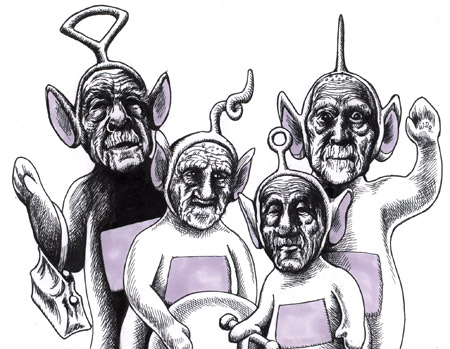
| HOME |
| NERVE |
| REVIEWS |
| ARCHIVE |
| EVENTS |
| LINKS |
| ABOUT US |
| CONTRIBUTORS |
| BACK ISSUES |
| CONTACT US |
Back to index of Nerve 20 - Summer 2012
From Watch with Mother to Waybuloo
 By
Sandra Gibson
By
Sandra Gibson
Image by Wayne Blackledge
Having young grandchildren has exposed me to pre-school TV. What a contrast with my own Watch with Mother days, when New Look ladies spoke to me in their finishing-school accents! Mainly puppet-based and cheerfully make-do-and-mend, this was cheap TV designed to keep children entertained. Only with the appearance of Sesame Street, with its huge budget, did programming for children beef up its objectives: radically changing the emphasis towards child development, education and the inculcation of positive values. The BBC’s Teletubbies had money, educationalists and child-development experts in from the start and this trend has been sustained: successful shows receive BAFTAS and make megabucks from merchandising. The youngest and most impressionable viewers represent the BBC’s most lucrative market.
From the plethora of choice in pre-school viewing I concentrated on a few acclaimed programmes to see what values, what trends, what services, were currently favoured. Teletubbies’ successor, In the Night Garden, has an irresistible offer: a tearless transition between waking and sleeping. According to the website, In the Night Garden is: Ragdoll’s response to the anxious times we seem to live in today. It is a warm enfolding programme, funny and reassuring. It directly references a pivotal moment in a child’s experience, bedtime – that universal time of formative imaginative intimacy, of pictures and thoughts. The world of Upsy Daisy, of Makka Pakka and the Tombliboos dissolves every evening with the magical image of Igglepiggle drifting off to the tranquil sea of sleep, a light bobbing on the mast, his security blanket a sail. All is well and this is what we would wish for our children: a safe bed.
Waybuloo, Teletubbies’ other successor, similarly addresses our age of anxiety, offering no less than a “philosophy for a happy life”. It presents a world momentarily threatened by pockets of gentle chaos safely overcome through friendly, cooperative strategies. De Li stands on a box to pick plumatoes, but Yojojo wants to store his instruments in it and the other Piplings want to use it to play hopsy. They decide it’s better to share it. The body/mind balance is also sustained by yoga-based exercises in which the on-screen children - Cheebies - join the computer-generated Piplings. How can any writer not be charmed by such additions to the culture as juggling singballs, owning a snuggly, playing liftyleaf, having bongleberries, jumpy seed, bop bop bats and whistle sticks?
Compared with the hippiedom of gardens and bells and the nirvana-like happiness called buloo, In the Night Garden does seem more firmly based on our ordinary unstable world. Public transport there is unorthodox and chaotic; Makka Pakka has OCD; the Tombliboos live without parental guidance or the benefit of banisters; the fecklessly large families don’t appear to have jobs - it’s a wonder the Daily Mail hasn’t been down - nor do they take off their clothes when they bed down in communal dormitories. Who on earth is in charge of Health and Safety? And is Upsy Daisy’s virtue safe from that incipient rebel Igglepiggle, with his coxcomb hair, Cameron forehead and inability to stay on the path?
But all ends well; everyone feels safe enough to drift off. I’m speaking of the sleep-desperate adults here - eschewing formative imaginative intimacy, the kids are still hitting one another with the leatherette cushions.
Balamory is another programme that has attracted awards. The adult actors look and behave as if they’ve leapt from a story book and are - mostly - colour-coordinated with their houses. They live in idyllic villagey-ness by the sea and promote cooperation and creativity through problem-solving and practical projects with the children. While this is reassuring and while no-one would fault its values, unlike the previous programmes it lacks magic and is priggishly repetitive in its worthy reinforcement of Today’s Lesson.
There’s no sign of worthiness in Justin Fletcher’s Something Special which is designed to teach children signing, supported by Makaton gestures, and is specifically aimed at children with delayed learning and communication difficulties, some of whom appear on the show. Fletcher’s sincerity about what he does, his versatile professionalism and commitment are what make this a successful programme which combines learning with fun.
The Labour government used the award winning cartoon Peppa Pig for the inauguration of its Sure Start initiative. It hasn’t been without controversy: some episodes showed the characters riding bicycles without helmets. This has been rectified: the programme creators take their responsibility seriously and listen carefully to their critics - whose money might fly elsewhere.
I like it when Peppa and George are cheerfully naughty but don’t tell mumsnet.
The world of pre-school TV is a bit brightly-coloured and soft-toyed for my taste. A bit smiley. A bit lacking in life’s drabness - well apart from the settee in Numberjacks. But then, I’m not two years old. There’ll be time enough for the grief of breaking one’s iPod screen or pets dying or grandfathers getting STDs. Let’s stick with the magic for a while and perhaps some of those life-skills will be handy later when some bastard wants to steal your bike.